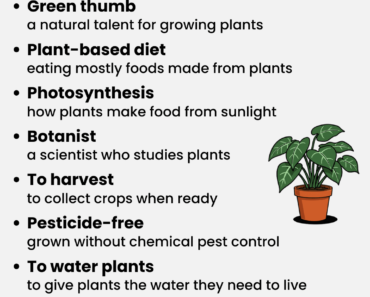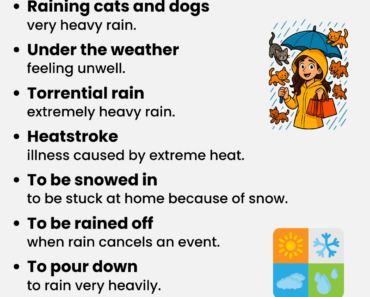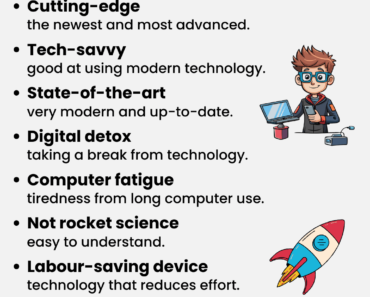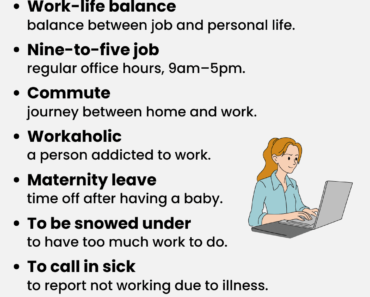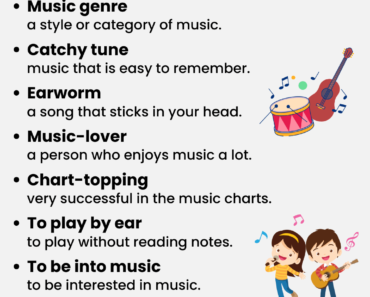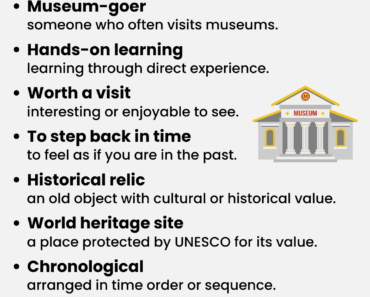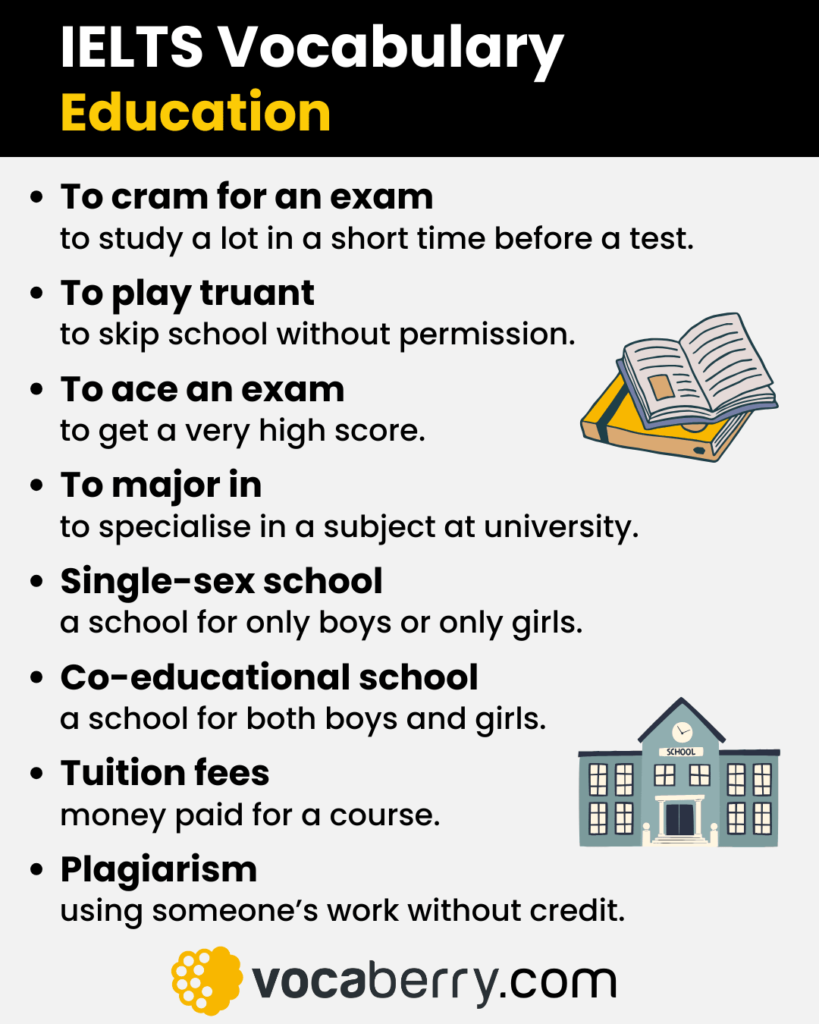
Education is a popular topic in the IELTS Speaking test. Examiners may ask you about your school life, university experience, learning habits, and opinions on education systems. In this guide, you’ll find useful IELTS vocabulary for education with clear definitions, followed by IELTS Speaking Part 1, Part 2, and Part 3 questions with sample answers.
IELTS Vocabulary for Education
Here is some useful IELTS vocabulary for talking about education with clear definitions. These words and phrases will help you give better answers in the IELTS Speaking test.
- Primary school – the first years of formal education.
- Secondary school – schooling for teenagers.
- Higher education – study at university or college.
- Compulsory education – education that is required by law.
- Tertiary education – another term for higher education.
- Vocational training – education focused on practical job skills.
- Apprenticeship – paid job training with study.
- Gap year – a year off to work, travel or volunteer before/after uni.
- Exchange programme – study for a short time in another country.
- Single-sex school – a school for only boys or only girls.
- Co-educational school – a school for both boys and girls.
- Boarding school – a school where students live on campus.
- State school – a free government-funded school.
- Private school – a school where parents pay fees.
- Student-centered learning – teaching that focuses on learners’ needs.
- Project-based learning – learning through real projects.
- Rote learning – memorising facts without understanding.
- Critical thinking – analysing ideas instead of memorising.
- Intensive course – a short course with a lot of material.
- To study abroad – to complete part of your studies overseas.
- To ace an exam – to get a very high score.
- To cram for an exam – to study a lot in a short time before a test.
- To drop out of school/university – to leave before finishing a course.
- To graduate from university – to complete a degree successfully.
- To broaden one’s horizons – to expand knowledge or experiences.
- To pass with flying colours – to do extremely well in an exam.
- To learn something by heart – memorising
- To work your way through university – to earn money while studying.
- To maintain academic integrity – to be honest in your studies.
- To scrape through an exam – to only just pass a test.
- To pull an all-nighter – to stay awake all night studying.
- To attend lectures – to go to classes at university.
- To play truant – to skip school without permission.
- To ask for an extension – to request more time to complete work.
- To fall behind with studies – to not keep up with the workload.
- To keep up with your studies – to stay on track with learning.
- To catch up on studies – to get back on track after falling behind.
- To sit an exam – to take a formal test.
- To resit an exam – to take a test again after failing.
- To major in – to specialise in a subject at university.
- To read (a subject) – to study a subject at university.
- To procrastinate – to delay doing something important.
- To skip classes – to miss lessons without a valid reason.
- To hit the books – informal phrase meaning to study hard.
- Career prospects – chances of getting a good job later.
- Plagiarism – using someone’s work without credit.
- Truancy – the act of skipping school without permission.
- Entry requirements – qualifications needed for a course.
- Tuition fees – money paid for your course.
- Student loan – money borrowed to pay for study.
- Curriculum – all the subjects taught in a school or university.
- Syllabus – the outline of topics in a course.
- Scholarship – financial aid for achievement.
- Bursary – financial help based on need.
- Internship – short-term work experience related to studies.
- Dress code – rules about what students wear.
- Past papers – previous exam papers used for practice.
- Mock exam – a practice exam under exam conditions.
- Group project – an assignment with classmates.
- Study buddy – a partner you study with.
- Pupil – a student in school
- Literate – able to read and write.
- Illiterate – unable to read and write.
- The literacy rate – the percentage of people who can read and write.
- Bachelor’s degree – a first-level university qualification
- Master’s degree – an advanced university degree after a Bachelor’s.
- PhD / Doctorate – the highest academic degree.
- Part-time job – work for some hours while studying.
- Well-educated – having received a high standard of education.
- Employability – skills that make someone likely to get a job.
- Face-to-face class – learning in person, not online.
- Transferable skills – abilities useful across many jobs, such as teamwork.
- Extracurricular activities – clubs, sports, or activities outside lessons.
- Attendance record – history of how often you were in class.
- Peer pressure – influence from classmates or friends.
- Academic pressure – stress caused by studying or exams.
- Learning curve – how difficult something is to learn at first.
- Bookworm – a person who reads a lot.
IELTS Speaking: Education Questions & Answers
In this section, you’ll find IELTS Speaking Part 1, Part 2, and Part 3 questions on education with sample answers. These examples show how the education vocabulary can be used in your responses during the test.
IELTS Speaking Part 1 – Education
Did you go to a state school or a private school?
I went to a state school, which was government-funded, so my parents didn’t need to pay tuition fees. It had a broad curriculum and plenty of extracurricular activities, which gave me a well-rounded education.
What was your favourite subject at school?
My favourite subject was English. I loved reading novels and analysing texts, which improved my critical thinking. I was a bit of a bookworm, so I enjoyed spending time in the library.
Do you prefer studying alone or with other people?
It depends. When I need to learn something by heart, I usually study alone. But for group projects or heavy workloads, I prefer working with a study buddy to share ideas.
How do you usually prepare for exams?
I usually make a revision timetable and practise with past papers. If the workload is heavy, I sometimes cram for an exam, but I try not to pull an all-nighter.
Do you think you were a good student at school?
I think so. I tried to keep up with my studies and meet deadlines, even though I sometimes procrastinated. Luckily, I still managed to graduate with good grades.
Do you plan to study abroad in the future?
Yes, I’d like to study abroad for a Master’s degree. It would broaden my horizons and improve my career prospects, and I hope to win a scholarship to cover tuition fees.
IELTS Speaking Part 2 – Education Cue Card
Describe a course you have taken that you found useful.
You should say:
- what the course was
- where you took it
- what it involved
- and explain why you found it useful.
Sample Answer:
One of the most useful courses I’ve ever taken was an intensive course in academic writing during my last year at university. I enrolled on the course because I knew I needed to improve my essays in order to get better grades and eventually graduate successfully.
The course was taught in a face-to-face class setting, but it also included some online learning. We had weekly lectures and smaller seminars where we discussed different writing techniques. There were also group projects where we worked with a study buddy to edit each other’s work, which really helped me keep up with my studies.
I remember the workload being quite heavy because the course was short, so I had to follow a strict revision timetable and sometimes even pull an all-nighter to finish assignments before the deadlines. Despite the pressure, I learned how to meet deadlines effectively and avoid procrastinating, which was a big problem for me before.
What I liked most was that the course focused on critical thinking rather than just rote learning. The teacher encouraged us to broaden our horizons by reading widely and analysing different academic disciplines, which made the subject much more interesting.
Overall, the course was extremely rewarding. It didn’t just help me pass with flying colours in my final exams, but it also improved my transferable skills, like writing clearly and managing my workload. I’d say it really boosted my employability and gave me more confidence in my academic abilities.
IELTS Speaking Part 3 – Education Discussion
IELTS Speaking Part 3 questions about education often ask you to compare different systems, discuss their advantages and disadvantages, and give opinions on how education influences people and society.
How important is it for people to continue studying after finishing school?
I think it’s very important, especially these days when job markets are so competitive. Some people choose to pursue higher education, while others take vocational training to get practical skills. Either way, continuing to learn helps people gain transferable skills that can improve their career prospects. Personally, I believe lifelong learning is essential in today’s world.
Do you think exams are the best way to measure students’ ability?
Not necessarily. Exams can show how well students learn something by heart or how much they can cram for an exam, but they don’t always reflect real understanding. Methods like continuous assessment or project-based learning often give a better picture of a student’s progress. I think exams are useful, but they shouldn’t be the only way to judge academic achievement.
How has technology changed the way people study?
Technology has completely transformed education. Many students now use online learning or distance learning, which makes studying more flexible and accessible. Digital resources also help learners keep up with their studies and avoid falling behind. Of course, some people still prefer face-to-face classes, but technology has definitely broadened opportunities for education worldwide.
Should education be free for everyone?
In my opinion, basic education should definitely be free, but higher education is more complicated. State schools already give equal access at the primary and secondary level, but universities often require tuition fees. Ideally, governments could provide more scholarships or bursaries so talented students from all backgrounds have the chance to graduate and improve their future employability.
What qualities make a good teacher?
A good teacher needs to be patient and supportive, but also able to challenge students. The best teachers encourage critical thinking instead of relying only on rote learning. They also give useful feedback so students can improve and keep up with their studies. I think the most effective teachers are those who can inspire students to enjoy learning and broaden their horizons.
More IELTS Vocabulary Topics
If you found this lesson useful, explore other IELTS Speaking topics to expand your vocabulary and practice with sample answers:
- IELTS Vocabulary: Accommodation
- IELTS Vocabulary: Advertisement
- IELTS Vocabulary: Animals
- IELTS Vocabulary: Art
- IELTS Vocabulary: Artificial Intelligence
- IELTS Vocabulary: Books
- IELTS Vocabulary: Childhood
- IELTS Vocabulary: Crime and Punishment
- IELTS Vocabulary: Culture and Traditions
- IELTS Vocabulary: Daily Routine
- IELTS Vocabulary: Environment
- IELTS Vocabulary: Family
- IELTS Vocabulary: Fashion and Clothes
- IELTS Vocabulary: Films
- IELTS Vocabulary: Food & Diet
- IELTS Vocabulary: Friends
- IELTS Vocabulary: Gifts
- IELTS Vocabulary: Health
- IELTS Vocabulary: Hobbies
- IELTS Vocabulary: Hometown
- IELTS Vocabulary: Money
- IELTS Vocabulary: Museums
- IELTS Vocabulary: Music
- IELTS Vocabulary: Plants
- IELTS Vocabulary: Shopping
- IELTS Vocabulary: Social Media
- IELTS Vocabulary: Sports
- IELTS Vocabulary: Technology
- IELTS Vocabulary: Transport
- IELTS Vocabulary: Travel
- IELTS Vocabulary: Weather
- IELTS Vocabulary: Work & Jobs

